
Hyundai Veloster Owners Manual
Rear seatsSafety features of your vehicle / Seats / Rear seats
Folding the rear seat
The rear seatbacks may be folded to facilitate carrying long items or to increase the luggage capacity of the vehicle.
WARNING
The purpose of the fold-down rear seatbacks is to allow you to carry longer objects than could not otherwise be accommodated.
Never allow passengers to sit on top of the folded down seatback while the car is moving as this is not a proper seating position and no seat belts are available for use. This could result in serious injury or death in case of an accident or sudden stop. Objects carried on the folded down seatback should not extend higher than the top of the front seats. This could allow cargo to slide forward and cause injury or damage during sudden stops.
To fold the rear seat
1. Insert the rear seat belt buckle in the pocket between the rear seatback and
cushion, and insert the rear seat belt in the guide to prevent the seat belt from
being damaged.
2. Set the front seatback to the upright position and if necessary, slide the front
seat forward.
3. Lower the rear headrests to lowest position.
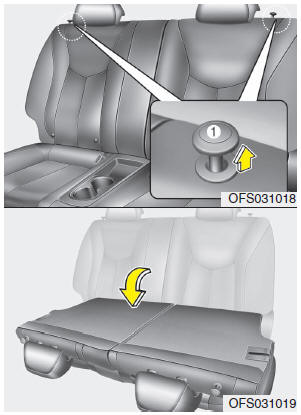
4. Pull the lock release lever (1) and fold the rear seatback forward and down
firmly.
5. To use the rear seat, lift and pull the seatback backward. Pull the seatback
firmly until it clicks into place. Make sure the seatback is locked in place. When
you return the seatback to its upright position, always be sure it has locked into
position by pushing on the top of the seatback.
6. Return the rear seat belt to the proper position.
7. When the seatback is completely installed, check the seatback folding lever again.
WARNING
When you return the rear seatback to its upright position after being folded down:
Be careful not to damage the seat belt webbing or buckle. Do not allow the seat belt webbing or buckle to get caught or pinched in the rear seat. Ensure that the seatback is completely locked into its upright position by pushing on the top of the seatback. Otherwise, in an accident or sudden stop, the seat could fold down and allow cargo to enter the passenger compartment, which could result in serious injury or death.
WARNING - Uprighting seat
When you return the seatback to its upright position, hold the seatback and return it slowly. If the seatback is returned without holding it, the back of the seat could spring forward resulting in injury caused by being struck by the seatback.
CAUTION - Damaging rear seat belt buckles
When you fold the rear seatback or put luggage on the rear seat cushion, insert the buckle in the pocket between the rear seatback and cushion. Doing so can prevent the buckle from being damaged by the rear seatback or luggage.
CAUTION - Rear seat belts
When returning the rear seatbacks to the upright position, remember to return the rear shoulder belts to their proper position.
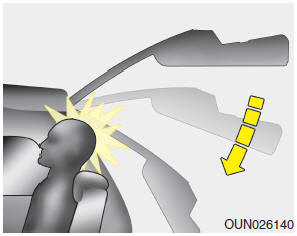
WARNING
Rear seat occupants should always remain in the center of the seat cushion so the occupantŌĆÖs head is protected by the headrest. If not, the tailgate may hit the occupantŌĆÖs head, which could injury.
WARNING - Cargo
Cargo should always be secured to prevent it from being thrown about the vehicle in a collision and causing injury to the vehicle occupants. Special care of objects should be taken when placing them in the rear seats, since those may hit the front seat occupants in a frontal collision.
WARNING - Cargo loading
Make sure the engine is off, the automatic transaxle is in P (Park) or the manual transaxle is in R (Reverse) or 1st, and the parking brake is applied whenever loading or unloading cargo. Failure to take these steps may allow the vehicle to move if shift lever is inadvertently moved to another position.
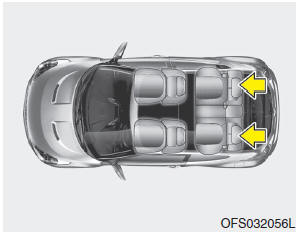
Headrest
The rear seat(s) is equipped with headrests in all the seating positions for the occupant's safety and comfort. The headrest not only provides comfort for passengers, but also helps to protect the head and neck in the event of a collision.
WARNING
- ŌĆó For maximum effectiveness in case of an accident, the headrest should be adjusted so the middle of the headrest is at the same height of the center of gravity of an occupant's head. Generally, the center of gravity of most people's head is similar with the height of the top of their eyes. Also adjust the headrest as close to your head as possible.The use of a cushion that holds the body away from the seatback is not recommended.
- ŌĆó Do not operate the vehicle with the headrests removed as severe injury to an occupant may occur in the event of an accident. Headrests may provide protection against severe neck injuries when properly adjusted.
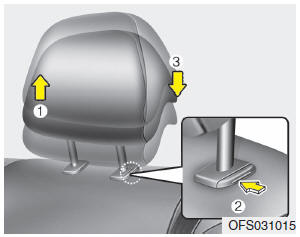
Adjusting the height up and down (if equipped)
To raise the headrest, pull it up to the highest position (1) by pushing the release button. To lower the headrest, push and hold the release button (2) on the headrest support and lower the headrest to the lowest position (3).
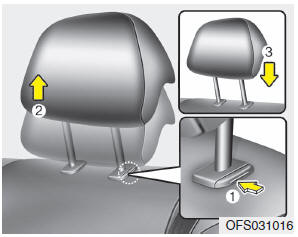
Removal (if equipped)
To remove the headrest, raise it as far as it can go then press the release button (1) while pulling upward (2).
To reinstall the headrest, put the headrest poles (3) into the holes while pressing the release button (1). Then adjust it to the appropriate height.
WARNING
Make sure the headrest locks in position after adjusting it for proper protection of the occupants.






